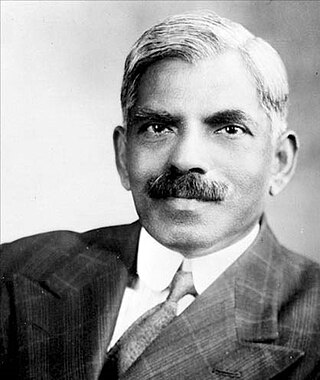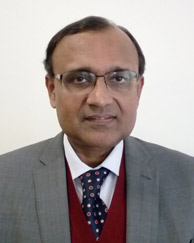
Braj Kumar Nehru MBE, ICS was an Indian diplomat and Ambassador of India to the United States (1961–1968).

Tirunellai Narayana Iyer Seshan was an Indian civil servant, bureaucrat who served with the Indian Administrative Service and as a politician. After serving in various positions in Madras and in various ministries of the Central Government, he served as the 18th Cabinet Secretary of India in 1989. He was appointed the 10th Chief Election Commissioner of India (1990–96) and became known for his electoral reforms. He won the Ramon Magsaysay Award for government service in 1996. After retirement as the CEC, he contested the 1997 Indian presidential election and lost to K.R. Narayanan after which he unsuccessfully contested 1999 Gujarat assembly election from Gandhinagar constituency under Indian National Congress.

Hirubhai Mulljibhai Patel CIE was an Indian civil servant who played a major role in the issues regarding internal and national security in the first years after the independence of India. From 1977 to 1979, he served as the Finance Minister and later Home Minister of India. He was also the chairman of the Charutar Vidya Mandal, which founded Vallabh Vidyapith that was later on named as Sardar Patel University, Vallabh Vidyanagar
Sir Narayanan Raghavan Pillai, of Elenkath, KCIE, CBE, popularly known as "Rag", was an Indian civil servant. He served as the first Cabinet Secretary in independent India, 1950–1953, and as the second Secretary General in the Ministry of External Affairs, He also served as India's Ambassador to France.

Kotha Raghuramaiah (1912–1979) was a veteran Indian politician and barrister who served as the Union Cabinet minister of Defence, Civil Aviation, Petroleum & Chemicals, Tourism and Parliamentary Affairs. He is one of the longest-serving cabinet minister in the History of India. The Members of Parliament from the Lok sabha and Rajya Sabha participate in a friendly Cricket competition annually for the honor of lifting the Raghuramaiah Trophy named after him.

Aftab Ghulam Nabi KaziSPk, SK, also known as AGN Kazi, was a Pakistani civil servant and a bureaucrat during the Cold War and during the post cold war. Kazi was born in Sindh, Bombay Presidency, in 1919 to an academic family. He started his career in the Indian Civil Service in 1944 and served as the Deputy Commissioner of Bihar and Orissa. After the partition of India, Kazi migrated to Pakistan and joined the Provincial Government of Sindh, and held positions such as Secretary of Finance and Secretary to the Governor.
"DESA's previous USG's". UN Department of Economic and Social Affairs. Retrieved 22 October 2012.

SirArcot Ramasamy Mudaliar was an Indian lawyer, diplomat, and statesman who was the first president of the United Nations Economic and Social Council and the 24th and last dewan of Mysore. He also served as a senior leader of the Justice Party and in various administrative and bureaucratic posts in pre- and Independent India. He was a prominent orator and was known for his inspiring speeches.
Jayant Prasad is a former Indian civil servant of the Indian Foreign Service cadre who served as the Director General of the Delhi-based Institute for Defence Studies and Analyses, a think-tank affiliated with the Indian Ministry of Defence between September 2015 and September 2018.

Diwan Bahadur Sir Narasimha Gopalaswami Ayyangar was an Indian civil servant and statesman, who served as the Prime Minister of the princely state of Jammu and Kashmir and later a minister in the first cabinet of independent India. He was a member of the drafting committee of the Constitution of India, the leader of the Rajya Sabha, a 'minister without portfolio' looking after Kashmir Affairs, and the Minister for Railways.
The 1931 New Year Honours were appointments by King George V to various orders and honours to reward and highlight good works by citizens of the United Kingdom and British Empire. They were announced on 30 December 1930.
Arcot Ramachandran (1923-2018) was an Indian scientist, anthropologist, author and a former Under-Secretary General of United Nations Centre for Human Settlements, known for his scholarship on the subjects of heat and mass transfer and environment and his social commitment to the cause of sustainable development. The Government of India honoured him in 2003, with the Padma Bhushan, the third highest civilian award, for his services to the fields of Science and Engineering.
The 1948 New Year Honours were appointments by many of the Commonwealth realms of King George VI to various orders and honours to reward and highlight good works by citizens of those countries. They were announced on 1 January 1948 for the British Empire and New Zealand to celebrate the past year and mark the beginning of 1948.
The 1942 New Year Honours were appointments by King George VI to various orders and honours to reward and highlight good works by citizens of the United Kingdom and British Empire. They were announced on 30 December 1941.
The 1941 New Year Honours were appointments by King George VI to various orders and honours to reward and highlight good works by citizens of the United Kingdom and British Empire. They were announced on 31 December 1940.
The 1938 New Year Honours were appointments by King George VI to various orders and honours to reward and highlight good works by citizens of the United Kingdom and British Empire. They were announced on 1 January 1938.
The 1928 New Year Honours were appointments by King George V to various orders and honours to reward and highlight good works by citizens of the United Kingdom and British Empire. They were announced on 30 December 1927.
The 1932 New Year Honours were appointments by King George V to various orders and honours to reward and highlight good works by citizens of the United Kingdom and British Empire. They were announced on 29 December 1931.
The 1933 New Year Honours were appointments by King George V to various orders and honours to reward and highlight good works by citizens of the United Kingdom and British Empire. They were announced on 30 December 1932.

T. S. Tirumurti is a retired Indian civil servant (Ambassador) of the Indian Foreign Service cadre. His diplomatic career spanned 37 years (1985-2022). He served as the Secretary to Government of India and later as Permanent Representative of India to the United Nations in New York when India became a non-permanent member of the UN Security Council for the 8th time. He was also the President of the UN Security Council for August 2021.








